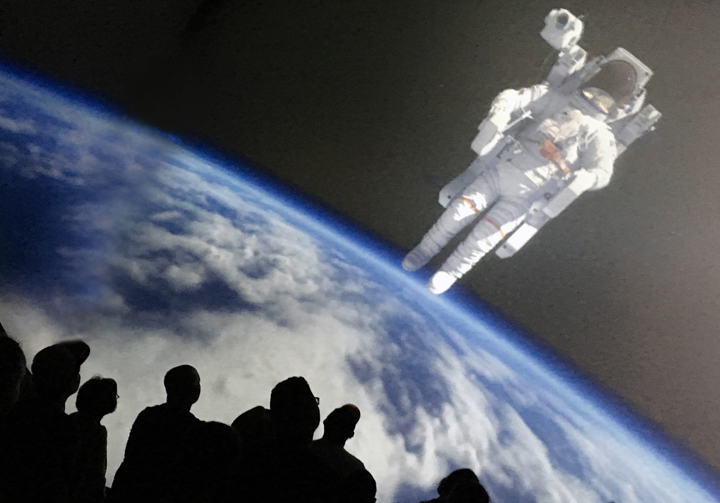(Photo by Thomas Froese)
(The Hamilton Spectator – Saturday, April 6, 2019)
CAPE CANAVERAL, FLORIDA – It was a question after dinner. The kids asked me. “So, Dards, if it were possible, would you rather know exactly how you’ll die, or when you’ll die?”
“Hmm,” I said. (Always a good response for such questions.) “I don’t know.” (Even better.) What I know is that, like many others, I’d rather not die alone. Imagine dying alone in, say, space.
In the movie Gravity there’s a scene. Sandra Bullock plays the lost, desperate astronaut. Her mission is in shambles. Her tiny space capsule floats in a sea of black nothingness. She’s going to die. Alone.
“Of course, we’re all going to die,” she finally blurts out, talking to no one and everyone at once. “But I’m going to die today!” Then she realizes the rest of the horrible truth. “And nobody has taught me how to pray!”
It’s one of those rare moments of truth. And makes one wonder: If you’re lost and dying in space, are you really alone? What about the Creator? Where is She? Hmm. He? What do we know? And see? Such timeless questions.
Consider the watchmaker argument: if you stumble upon a watch, you can conclude a watchmaker exists. It’s credited to 18thCentury thinker William Paley, but the original thinking dates more to ancient Greece. Then other arguments like in, say, Richard Dawkins’ The Blind Watchmaker.
My own view, though, is that the entire watchmaker image falls short because God seems to be, in the words of the writer Melville, all brain. “The reason the mass of people fear God, and at the bottom, dislike him, is they rather distrust his heart and fancy him all brain, like a watch,” is how he put it.
No, I, for one, am putting my money on the evidence of a more lively Creator with a good heart, not some old dude with a long hipster beard who set a mechanized universe in motion, then left us to our own devices. Otherwise, why not believe in nothing and conclude that everything, uhm, just made itself?
In either case, we’re watching space movies these days. We, the family. Movies like Gravity. First Man. Apollo 13. All Oscar winners. And Apollo 11, the new documentary with all that original 1969 footage from that first moon voyage and those early sky sailors. Fifty years ago.
Yes, we’re watching, even as the five of us, one fine day, recently stood at Cape Canaveral to watch a rocket launch. It was something. People lined roadsides and beaches. The light pierced the darkness. The fury and the sound, eventually, caught up. And before that the children and their mother and I had visited the Kennedy Space Centre to learn of NASA’s history. Its wild failures. Its hopes.
Mars travel, soon. I’ll have a window seat, please. (You laugh. They laughed at Galileo too. Which is to say we’re working on it, but we still have no idea how much we don’t know.)
Consider the Earth spins 1,000 miles an hour, all six sextillion tons – that’s six with 21 zeroes – balanced on some invisible axis at precisely 23 degrees, an angle that (Happy spring) gives us seasons. So perfect. So effortless.
Or consider the Earth revolves around the sun, one small star of our galaxy’s 100 billon orbs. Hold a dime at arm’s length and block 15 million stars from your view.
You know I could go on. Space is so overwhelming. So mysterious. But to die in its cold beauty? In fact, 19 astronauts – 14 American, four Russian and one Israeli – have died in space flights. Thirteen other people have perished in test flights or training. So in this season of remembering, we can remember this too. Remember them.
I easily remember the 1986 Challenger shuttle disaster. There it is on TV. Live. BANG! There was no time to say goodbye, never mind pray. Shortly later, a young man, I left home on an early morning bus. Funny, such memories and associations.
Someday we’ll know more. And it seems to me that someday, with good fortune, even in death’s darkness, we won’t feel so alone. In the meantime, we have these windows to the soul. And, on good days, a good view of it all.


This is beautiful, thought-provoking. Thanks for sharing.
And thanks for reading, Patty. Best with all your own ongoing work.
Thanks, Thom. Informing, engaging, and thought-provoking, as always. ~+~
Beautiful and challenging post. Thanks Thom. Greetings from Kampala
Love the things you make us stop and think about. Thank you.
(Went to high school with your wife. Please say hello!)
Thank you, Marisca. Jean has fond memories of those years and talks about them often.
Thanks Emmanuel. Ah, from Kampala, the land of warm skies and warm people.
Good to hear from you, Peter. Thanks for keeping in touch.